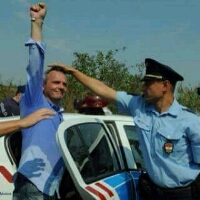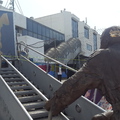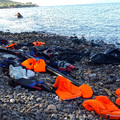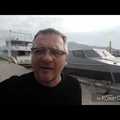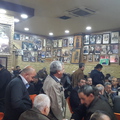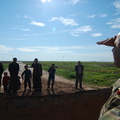Istanbul, end of the road
Now, should come the numbers, statistics, wise and deep thoughts, now and here I must have prepared the ground for this whole new journey, instead I am here, sitting on the floor of a shabby building’s cellar in Istanbul’s Sulejmanije district surrounded by at least ten Syrian Kurds, those who are trying to tell their refugee story in a way that at the end the conclusion is that I will help them with a little bit of change. They let only one women into the room, a tattooed faced old lady who found her place right next to me, just to shove her fist into my ribs in the first five minutes, then she showed me that the only thing she needed was money. The blind fate and, what other social website than Facebook, brought me here through Anastasia the young artist from Bournemouth. She just happens to help the refugees stuck in Istanbul since 2012.
- It started totally accidently. I was just here in Istanbul, just like every year since I was five. The refugees came to this neighborhood, they slept in the parks, on the the streets everywhere. SO I gave them water, nappies and other necessary items for those who had kids.
Then Anastasia made a Facebook page, collected donations, bought and distributed more stuff. The only difference was, is that she came more frequently to Istanbul than before and not only for the summer. She lives like two minutes from the Aksaray metro station at a friend’s place which is a very practical choice, since the square at and the streets around the Aksaray station became the epicenter of the refugee crisis in Istanbul. The big oval shaped square at the the station fills up with refugees every day. In the afternoon it is difficult to find a place to even sit down. The restaurants and other local businesses became bilingual. Arabic became their second language.
- That is the Hor Hor Cafe, the one which flies the Turkish flag, - shows Anastasia. Those doggy characters on the terrace organize the trips. Here everything is about the refugee crisis. She came back from Bodrum recently. - While I was there every single day at least thirty dead bodies were washed ashore. And most of these stories were unreported by the international media. The most horrible story was the tragedy of that eighteen month old baby who lost both of her parents because the Turkish Coast Guard, saved kids lives first when their boat was capsized. Then after the body count they figured that this eighteen month old left orphan since her parents did not reach Greece nor Turkey. Now she is in a orphanage waiting for adoption.
Her friend’s brother just left a few days ago to Europe. They tried to convince him that it just became a lethal business, don’t do it. But no avail. Fortunately the little brother arrived to Kos in one piece. While Anastasia is telling me the story we are just in a supermarket to pick up nappies. That's what they need where we go, - she says, and I have absolutely no idea where we are going to.
We're just dragging ourselves up on the hills from Aksaray to Suleymanije, but before everything we get into the mosque to burn the view of the city on our retinas. And there it is the Bosphorus, then the Golden Horn, the bridges, the steamers, the non steamers. Only Pamuk’s melancholy is missing, but just before I could have gotten into that, having watched the boats sailing towards the Asian shore, one of the bags fell from the bench, and I was there standing in a sea of nappies reaching up to my ankles. We leave the mosque. At the gate two girls suspect the possibility of getting some fee stuff, follow us. They only need one pack, thats what they try to explain to me.
- They are from that place where we go now, - tells Anastasia as she tries to keep the girls away.
Right next to the outer walls of the mosque is that ran down two story building. We are about arrive there, if we could go through. But we can’t. There are about thirty kids and a dozen of adults wanting to get some the nappies. Only the people with small kids can get one. It lasts for fifty seconds. One of the men, whose wife received a pack invites us into the house. Down to the basement. That is where the men gather. Sitting around, drinking tea and pretty humid meeting, that we have here, but no real information. When the old lady with the tattooed face hits my back the third time, sweat runs into my eyes, that is the moment I suggest that we leave - more exactly to continue outside. Amad comes next to me while we are stepping outside. While Anastisa is checking a 6 days old newborn, I can talk to Ahmad.
It turns out that this Syrian Kurdish group is form Kobani.
- No, we are not from the town of Kobani but from villages around. Those were leveled by the IS at the very beginning of the offensive, last year. Thats why we are here.
And they stuck in here. They are poor. Very poor. They can only dream of that 1200 bucks the trip costs to a Greek island.
- What do you do for living?
- Whatever comes across. The kids go begging and we do everything just to be able to pay the rent for this place, - he shows with his index finger upstairs. The building is just a ruin. Nevertheless at least sixty people live in the two upper floors and in the basement. When I ask Ahmad about the camps, he stays quiet. No words. He does not want to talk about the camps as a possibility. Anyhow, out of the more than two million refugees in Turkey only 260 thousand live in camps. The rest are like these Kurds. Absorbed by the situation, or a gigantic metropolis which needs cheap labor desperately. We are leaving at least two doyens fo kids on our heels. They still have the hope that some money will be the end of the story. A garbage truck is being packed in the street. A young fella says hello from behind the cardboard boxes. He is afghani who speaks good English. An other one who stuck in Istanbul. Filthy job for cheap. Just... just have enough for that fucking rubber boat, that inflatable one which perhaps capsizes but that the only hope for a better life, somewhere else.
(The project is part of the “Transatlantic Leadership Initiative” (TLI) and was made possible by support from the German Marshall Fund of the United States.(
